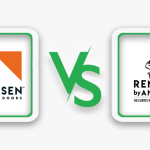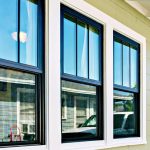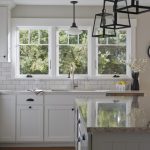Gone are the days when all you had to worry about when selecting new windows was if you could find stylish window hardware to fit out-of-the-box windows. Today, homeowners have endless style and performance options for replacement windows. We want to focus on options that minimize heating and cooling costs and how selecting windows can help homeowners protect their homes.
Selecting the right energy-efficient windows is an important part of having an efficient home. So how do you know what will give you the best bang for your buck when it comes to selecting your new windows?
There are four main factors that contribute to window performance: frame, glass, design and installation.
1. Window Frames
You might have heard that wood frames are less prone to heat and cold transfer than aluminum, but does that mean they’re the most energy efficient? Not quite. There are a variety of window frame materials, and each has its positives and negatives. It’s up to you to decide what’s best for your style and your budget.
Wood: Wood is both beautiful and has good insulating properties. However, the natural look of wood involves considerable maintenance. Besides periodic painting or staining, wood windows must be treated to protect them from moisture, movement, and rot.
Wood-Clad: These windows offer the beauty of wood on the inside, with a vinyl coating on the wood frame outside. This offers the low maintenance that makes vinyl so popular, while giving the beauty and natural feel of stained or painted wood on the inside.
Vinyl: From lass windows to energy-efficient, vinyl windows are popular, versatile and durable. Vinyl is also virtually maintenance-free and is the most reasonably priced frame type.
2. Looking Into Window Glass
While the material each window is constructed from is important, what’s on the inside counts just as much. There are a few different glass enhancement options to choose from that can make your windows more effective. For example, Low-E, argon-filled, double-paned windows provide significantly more insulation than a single-pane window. The Low-E (low emissivity) coating helps to filter out harmful UV rays, which is really important in Minnesota summers. Meanwhile the double-pane, gas filled windows help keep your home at the temperature you want by keeping cool air in during the summer and warm air in during the winter. Every window we sell at Great Plains Windows and Doors qualifies for the Energy Star program and is labeled with a sticker containing ratings from the National Fenestration Rating Council (NFRC). To qualify for Energy Star status, window manufacturers have to meet standards on these two main metrics:
U-value: measures a window unit’s resistance to heat loss
Solar Heat Gain Coefficient (SHGC): measures how much heat enters a home through the glass
For both U-Value and SHGC, the lower the number, the better the window should perform.
3. Window Design Impacts Efficiency
Some window designs are inherently more energy-efficient than others. The most common types include:
Single or Double Hung Windows: These are among the most common windows and are found in most homes. A single hung window has only one sash (moving part of the window) and opens from the bottom only by sliding up. A double hung window can be opened from either the top or the bottom, as it has two sashes.
Casement Windows: These windows usually consist of one large sash that is hinged vertically and opens by swinging out. Usually a lever or other mechanism is used to open this style of window.
These windows are popular in windy climates and actually seal themselves off tighter when wind blows in toward the house. However to ensure continued stability and efficiency, they do require maintenance on hinges and seals.
Awning Windows: These windows are hinged at the top and opened by tilting the window out from the bottom.
These windows are most popular over kitchen sinks, in bathrooms and in mid-century modern homes.
Gliding/Slider Windows: These windows slide open from side to side and are an excellent choice when there is limited space outside to swing the window open.
Fixed Picture Windows: Stationary windows that don’t operate are called picture windows. They can be part of a combination window with double hung or casement windows or can stand alone.
4. Installation to Seal the Deal
Lastly, the importance of installation cannot be overlooked when discussing window efficiency. Even the most expensive window unit won’t perform effectively if it’s not installed correctly. Flashing and proper caulking may be the cheapest parts of window installation, but if they’re not done right, the ensuing water leaks can cause a barrage of problems that could have been easily prevented.
While the parts of a window can be energy efficient, it’s important to look at the energy efficiency of your window as a whole and not just the different components. Focus on the big picture when purchasing your replacement windows and you’ll see more benefits in the long run.
ABOUT US
At Great Plains Windows and Doors, We are all Andersen, All the time. And we’re the only ones doing it this way in the Twin Cities. Come see what we have to offer.
If you need some help looking at a patio door and evaluating it or coming up with a replacement patio door solution in St. Paul or Minneapolis, look no further than Great Plains Windows and Doors. Our resident experts are here to help. Find out more at www.GreatPlainsWindows.com or call us today at 651-207-4571.







